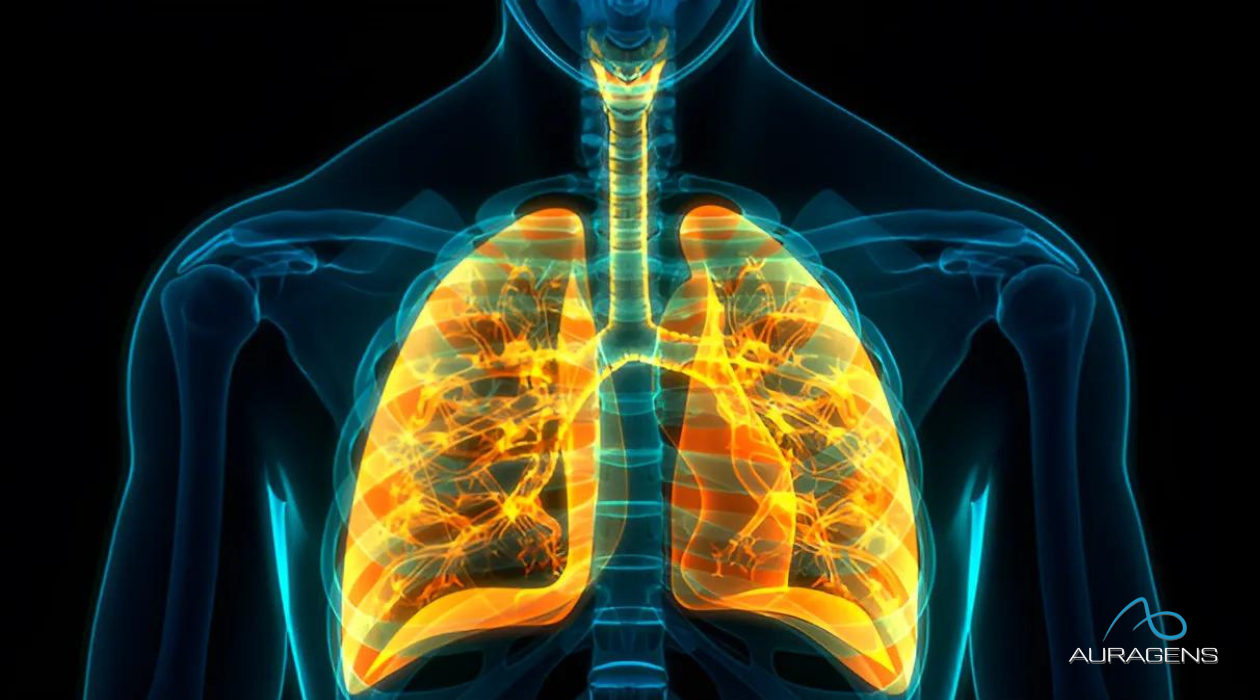
Pulmonary issues, or diseases affecting the lungs, are a major public health concern worldwide. The most common include chronic obstructive pulmonary disease (COPD), pulmonary fibrosis, asthma, and acute respiratory distress syndrome (ARDS). These conditions can lead to difficulty breathing, reduced oxygen intake, and a significant decrease in quality of life. Current treatments often focus on managing symptoms, as there have been few options available that target the root causes or promote tissue repair.
However, Auragens is helping to improve a person’s treatment options. One of the most promising developments in addressing these conditions is the use of mesenchymal stem cells (MSCs) for treatment, and we are at the forefront of this research. MSCs are a type of stem cell with the unique ability to reduce inflammation, modulate immune responses, and promote tissue repair. This makes them highly beneficial for treating a variety of pulmonary issues.
1️⃣ Chronic Obstructive Pulmonary Disease (COPD): COPD is marked by chronic inflammation of the lungs, leading to the destruction of lung tissue. MSCs can help reduce inflammation and potentially regenerate damaged tissue, offering hope where traditional treatments mainly aim to alleviate symptoms.
2️⃣ Pulmonary Fibrosis: This condition involves scarring of lung tissue, which makes it difficult for the lungs to function properly. MSCs can help slow or even reverse fibrosis by promoting healing and preventing further tissue damage.
3️⃣ Acute Respiratory Distress Syndrome (ARDS): ARDS, often a result of severe infections like pneumonia or trauma, leads to fluid accumulation in the lungs. Auragens is studying MSC’s for their ability to reduce inflammation and fluid buildup, potentially reducing the severity and mortality of this condition.
4️⃣ Asthma: In asthma, inflammation and airway constriction are major contributors to difficulty breathing. MSC treatments may help reduce airway inflammation and immune overactivity, leading to better management of asthma symptoms.

The advantage of Auragens’ approach is our focus on delivering safe, well-researched MSC therapies tailored to these pulmonary conditions. With growing evidence supporting MSC’s regenerative potential and ability to address unmet medical needs, treatments offered by Auragens could not only improve patients’ quality of life but also pave the way for new standards in pulmonary care.
Auragens’ treats pulmonary issues leveraging the unique biological properties of these cells, offering multiple therapeutic benefits. Here’s how MSCs help with specific pulmonary conditions:
1️⃣ Anti-inflammatory Effects
Many pulmonary diseases, such as COPD, asthma, and ARDS, involve chronic or acute inflammation in the lungs. MSCs have a natural ability to modulate the immune system, reducing excessive inflammatory responses. When inflammation in the lungs is uncontrolled, it leads to tissue damage and worsens symptoms like shortness of breath and reduced lung capacity. By administering MSCs, Auragens aims to calm this inflammation, potentially slowing the progression of diseases like COPD and asthma.
2️⃣ Tissue Regeneration and Repair
Pulmonary fibrosis, for example, involves scarring of the lung tissue, which is largely irreversible with current treatments. MSCs secrete growth factors and other bioactive molecules that promote the repair of damaged tissues and encourage the regeneration of healthy cells. This capacity for tissue repair is crucial in diseases where lung tissue is progressively damaged, such as pulmonary fibrosis. By enhancing the body’s natural healing mechanisms, MSCs can help slow or even reverse some of the damage caused by these conditions.
3️⃣ Modulating the Immune System
In diseases like ARDS and asthma, the immune system can overreact, leading to an excessive response that damages lung tissue. MSCs help regulate this immune activity, reducing the likelihood of the body attacking its own tissues. In ARDS, for example, the immune system often causes fluid buildup and lung injury in response to infections or trauma. MSCs may prevent or minimize this immune-driven damage, improving lung function and recovery rates.
4️⃣ Reduction of Fibrosis
In conditions like pulmonary fibrosis, MSCs can help reduce the development of scar tissue in the lungs. They release specific factors that inhibit fibrosis ( which is the excessive buildup of scar tissue), helping maintain better lung elasticity and function. For patients with progressive lung diseases, slowing fibrosis can make a significant difference in lung capacity and overall breathing ability.
5️⃣ Protection Against Further Damage
MSCs have protective properties that help prevent additional damage to lung tissues. Whether from oxidative stress, immune attacks, or external triggers (like pollutants or allergens in asthma), MSCs provide a protective effect by reducing harmful biochemical signals in the lungs. This helps preserve as much healthy lung tissue as possible.

Dr. James Utley, Chief Scientific Officer at Auragens








